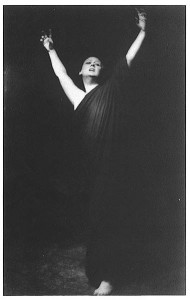In his U.S.A. Trilogy, modernist master John Dos Passos incorporated all manner of experimentation and ephemera, including idiosyncratic biography. One of the towering figures of early twentieth-century America he wrote about was the great dancer Isadora Duncan. An excerpt from his writing about Duncan’s hand-to-mouth upbringing with her mother and siblings (all punctuation and spellings are Dos Passos’):
“she bore a daughter whom she named after herself Isadora
The break with Mr. Duncan and the discovery of his duplicity turned Mrs. Duncan into a bigoted feminist and an atheist, a passionate follower of Bob Ingersol’s lectures and writing, for God read Nature; for duty beauty, and only man is vile.
Mrs. Duncan had a hard struggle to raise her children in the love of beauty and hatred of corsets and conventions and manmade laws. She gave pianolessons, she did embroidery and knitted scarves and mittens.
The Duncans were always in debt.
The rent was always due.
Isadora’s earliest memories were of wheedling grocers and butchers and landlords and selling little things her mother had made from door-to-door.
helping handvalises out of back windows when they had to jump their bills at one shabbygenteel boardinghouse after another in the outskirts of Oakland and San Francisco.
The little Duncans and their mother were a clan; it was the Duncans against a rude and sordid world. The Duncans weren’t Catholics anymore or Presbyterians or Quakers or Baptists; they were Atheists.”

